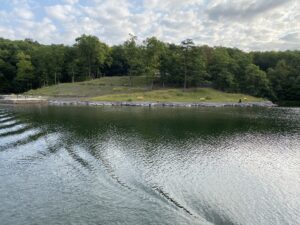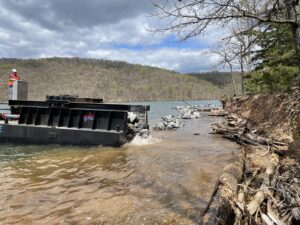The Pennsylvania Fish and Boat Commission (PFBC) recently partnered with the U.S. Army Corps of Engineers (USACE), Friends of Raystown Lake, PA Lake Management Society (PALMS), and the Reservoir Fisheries Habitat Partnership (RFHP) to improve recreational opportunities at the popular 8,300 acre Raystown Lake located in Huntingdon County. Shoreline erosion, boat mooring access, and loss of fish habitat due to the reservoirs aging was determined to be key areas that could be improved upon.
In 2021, the partnership completed major renovations at the Susquehannock Campground and the Twin Hollows Access. The projects not only addressed the needs of the fishery, but the USACE also improved the areas with park amenities such as level camping and picnicking pads, plus a new fishing pier.
In 2022, the partnership started improving the highly eroded shoreline at Mile Marker 11. This project was funded by a $24,000 grant from PALMS. PFBC staff installed sawtooth deflectors to create a wind and wave break wall. These rock deflectors will provide habitat for various game fish species and improve macroinvertebrate colonization. The structure will also improve water quality by reducing sediment and nutrients entering the watershed and will allow a natural riparian buffer to reestablish on the lake shore behind the rock. Anglers will also be able to target this area as a fishing hot spot as bass, walleye, panfish, and other species will utilize the rock habitat throughout the year. In September, PFBC staff will be working on creating rock reefs at Mile Marker 15 and 16. These rock reef sites will be used by all fish species, but the main goal is to improve natural walleye recruitment at the lake. Juniata College will be monitoring these areas for walleye spawning activity. Raystown Lake habitat partners recently received an RFHP grant for $75,000. This funding will be used in 2023 to further expand shoreline stabilization work at Mile Marker 11 and add 150 wooden fish habitat improvement structures throughout the lake. These types of structures will be placed in areas of the lake that are devoid of fish habitat. Projects like these would not be possible without conservation-minded partners like Friends of Raystown Lake, U.S. Army Corps of Engineers, PA Lake Management Society, and Reservoir Fisheries Habitat Partnership.



